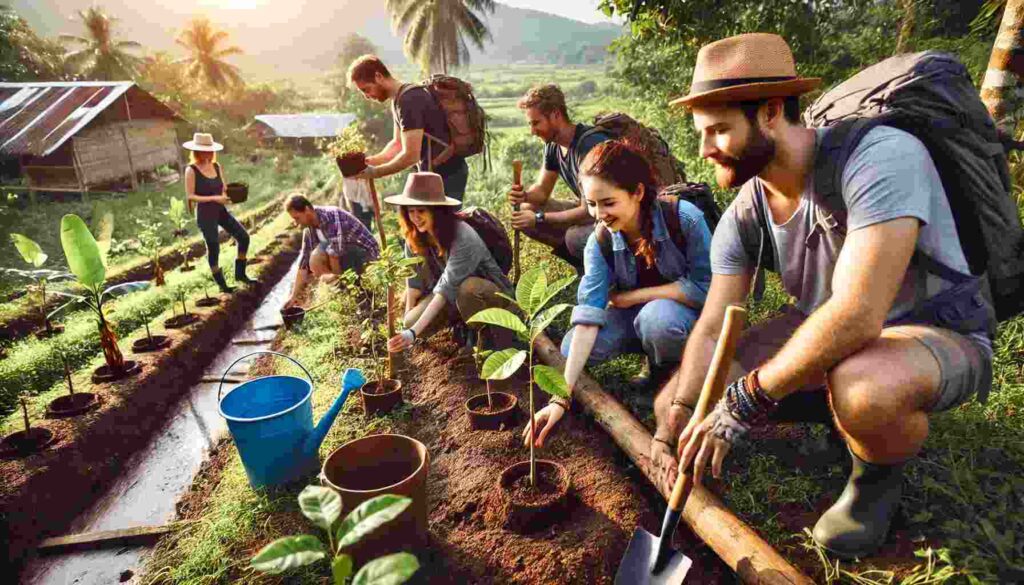Traveling is one of life’s most enriching experiences. It allows you to explore new places, meet fascinating people, and immerse yourself in diverse cultures. However, the way we travel has significant consequences for the environment and the communities we visit. As the world becomes more aware of climate change and environmental degradation, the concept of eco travel, or sustainable tourism, has gained traction.
Eco travel is not just about protecting the environment; it’s about respecting the people and cultures of the destinations we visit. By embracing eco travel, you can have a meaningful and responsible experience, one that allows you to deeply connect with local cultures while minimizing your ecological footprint. This article will explore why eco travel is the best way to experience local cultures and how it benefits both the environment and the communities we explore.
What is Eco Travel?
Eco travel (also known as sustainable or responsible tourism) prioritizes positive environmental impact and conservation efforts alongside respecting and supporting local cultures. In essence, the principle of eco-travel is practically balancing pleasure and duty. It encourages travelers to think about their travel options and how those choices impact the planet and the people living at their destination.
More traditional, environmentally friendly tips include staying in hotels with renewable energy sources, not using single-use plastics, and keeping your money away from larger multinational companies, where all profits will be whisked off to other countries. Eco travel is also about understanding that these are real people with their culture, languages, and traditions, so speaking a few words of the local language, buying items from local artisans, and eating food sourced locally all contribute to supporting the community.
Opt for eco-travel, and you are helping to create sustainable tourist spots, meaning the land and culture will last a very long time, more than even wild being lost into oblivion. This means you can spend considerate time in new experiences and locations that fulfill you both while being respectful towards the world you walk in.

Cultural Immersion Through Eco Travel
Culture Cultural immersion is the most significant benefit of eco-travel. Sustainable travel means you meet locals for a more authentic experience. Smaller, locally owned accommodations or eco-lodges are often favored over large hotels. Gravitymadnesseco-travel encourages tourists to follow ecological principles and a more sustainable approach, local growers markets, slow food proponents with their natural connection, and moves like Zero Waste programs. All experience offerings limit the environmental impact and have historically significant locals who can tell stories of their cultures.
Whether traditional or contemporary, eco-travel encourages environments that place you in positions you might otherwise miss; Spaceship Earth is an opportunity to take your inner space traveler-based global cultural experiences and expand! For instance, you could go to a local festival, take cooking lessons, make a traditional recipe, or do an arts & crafts workshop. It brings a new perspective into your trips and puts you in sight of the communities you will be able to know daily, including their functionalism and their way of life.
Eco-traveling may mainly entail responsible involvement in the cultural practices of Indigenous tribes. That can involve living in a homestay where the hosts impart their culture, from stories and traditional dance to rituals. These interactions create a holistic travel experience that enables you to learn directly from the custodians and champions of their culture.
Support for Local Economies and Communities
The places you are contributing a net positive economic impact with your eco-travel. Selecting eco-friendly choices like locally-managed accommodations, dining with family-owned restaurants, and using guides not only support the local economic climate promptly. Eco-tourism is not like mass tourism. That mostly favors big international companies, with your rate needing to be seen in the community.
By doing this, you engage in local economies and more ethical tourism. The makers and farmers you buy from welcome a helping hand, but so does anyone who plans to offer guided visits. On top of that, you are adding to the jobs and saving cultural practices that are dead set on losing out against globalization without such actions.
Eco travelers sustain local markets, such as locally sourced goods, including handmade products, which can be found in many regions worldwide. By supporting these small local businesses, we are helping makers keep their shops alive and farmers land in a more environmentally friendly way. Travelers, in turn, get holds of authentic, uncut items and initiatives that deeply echo the traditions in the area they are traveling.
Protecting Natural and Cultural Heritage
Eco-travel is not just an excuse to see beautiful landscapes or historical places; it comes from the desire to preserve them for our children. As much as mass tourism might bring economic value, it can ruin the environment and put cultural practices at risk. Locations with too many tourists can avoid pollution, habitat loss, and the erosion of local customs and traditions as they are commercialized to meet tourism demand.
Meanwhile, eco-travel encourages the preservation of nature and culture. When you choose a sanctuary as your vacation destination and give it more importance, visit national parks, World Heritage Sites by UNESCO, or even any other protected area of the world in this way, you are directly contributing to conservation. They offer strict regulations, protecting and guaranteeing the health of wildlife and ensuring that all fauna and flora species thrive in their natural environment.
In addition to protecting the planet, eco-travel helps save cultural practices that would disappear due to the impacts of modernization. Countless traditional celebrations, dances, and the local languages and art forms need the support of visitors who solidly appreciate and respect these customs. As an eco-traveler, partaking in these cultural experiences keeps them alive.
One example is eco-tourism in Costa Rica, which has saved rainforests and biodiversity while also helping native communities. Those engaging in eco-friendly tours can also help finance conservation programs to protect the land and sustain its inhabitants without harming culture or tradition.

The Environmental Impact of Traditional Travel
As exciting and fulfilling as travel can be, traditional tourism leaves a substantial ecological footprint. Long-haul flights, cruise ships, and mega-resorts actively pollute and deplete. Travel is estimated to be responsible for around 8% of global carbon emissions, with transportation and energy-hungry accommodations making up the bulk.
In addition to carbon emissions, typical tourism generates waste primarily in places not built to cope with large numbers of visitors. Unchecked tourism has resulted in beach plastic pollution, city overtourism, and ecosystems ravaged to make way for roads and other structures.
Moreover, traditional travel may eventually harm local cultures by forcing destinations to cater to tourist tastes instead of keeping their authentic traditions. This may lead to a form of cultural commodification, where sacred rituals and local practices act as performances for tourists. On the contrary, eco-travel helps preserve local culture and supports real sustainable experiences.
How Eco Travel is More Fulfilling
Eco-tourism is said to be more spiritually rewarding and more spiritually fulfilling than traditional tourism. This is because eco-tourism makes you slow down and interact with the environment. Eco-tourism means slowing down instead of rushing to each tourist attraction on your itinerary and taking the time to soak up a destination’s natural beauty, history, and culture as you pass through.
Eco travel and often slow travel are the opposite of go-getter behavior: they focus that same drive to move forward on staying in places long enough and deep enough. You could spend a week or two in each village along the way and get to know the local people, learn about their lives, make some friends, and so on. You may also discover a new skill, like making local crafts or cooking choices, further enhancing your travel experience.
Eco-travel also has real emotional and educational benefits. At the end of the visit, many travelers exit Green Destinations with a newfound respect for Mother Nature and the people they meet. It personally develops you by pushing you out of your comfort zone, making you more aware and conscious about your actions, and creating a greater sense of global responsibility.
Practical Tips for Eco-Friendly Travel
- Reduce Plastic Waste: Carry a reusable water bottle, say no to plastic straws, and avoid single-use plastics.
- Use Public Transport or Walk: Whenever possible, use public transportation, rent a bicycle, or walk to reduce your carbon footprint.
- Choose Green Accommodations: Stay at eco-certified hotels or lodges that prioritize sustainability.
- Support Local Businesses: Eat at locally-owned restaurants, buy souvenirs from local artisans, and book tours with local guides.
- Offset Your Carbon Footprint: Consider offsetting the carbon emissions from your flights by investing in reforestation projects or renewable energy initiatives.

Conclusion
Eco travel is not just a trend; it is the future of tourism. It offers a way to explore the world that is both meaningful and sustainable. By embracing eco travel, you can experience the richness of local cultures, support communities, and protect the environment. As you plan your next trip, consider the impact of your choices and opt for eco-friendly practices. After all, the best way to experience the world is by leaving it better than you found it.



